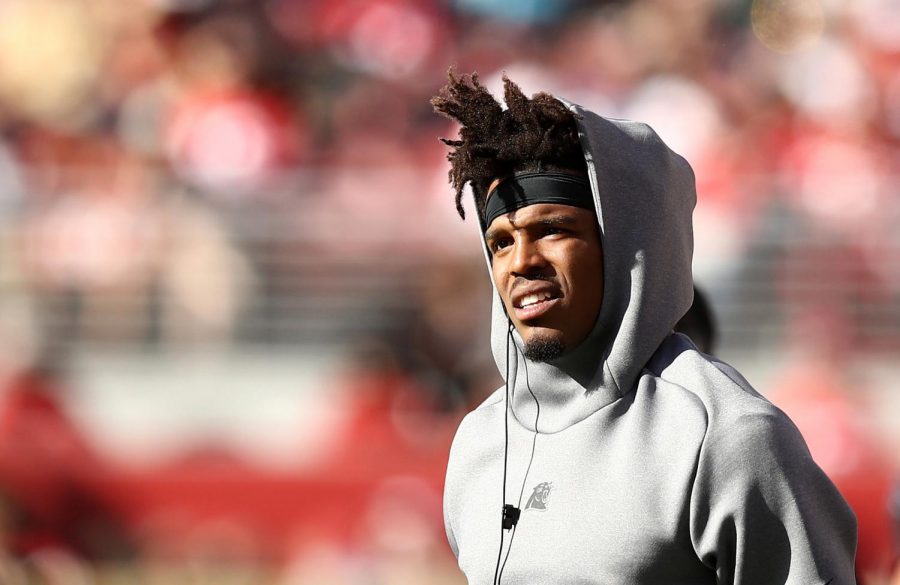Language should bolster Black athletes in sports
Cam Newton became the target of people who just don’t like “showboating” and celebrations.
July 7, 2020
When former Carolina Panthers quarterback Cam Newton bulldozed the NFL in 2015 — en route to NFC Offensive Player of the Year and MVP honors — he did it with pep in his step and a trademark 1000-watt smile. There was no mistaking how much Newton was enjoying the rarely seen success he had brought to Charlotte.
A 15-1 record, more than 4,500 total yards and 45 touchdowns, each one capped with a spirited end zone dance and football gifted to a child in the stands. But inevitably, Newton became the target of people who just don’t like all the darn “showboating” and celebrations.
Newton has since been spurned by the Panthers and is shipping up to Boston to play for New England, but the criticism followed. Michael Felger, a Boston radio host on 98.5 The Sports Hub, voiced his hopes Tuesday that Patriots head coach Bill Belichick will limit Newton’s post-touchdown performances.
“How about culture?” Felger said. “Even something as simple and seemingly innocuous as the [dabbing] and the Superman-ing and all the celebrating and the showboating on the field — they don’t want you doing that here … Something as simple and innocuous as that, you think he’ll be able to contain it?”
Felger used a pair of baseless claims to back his opinion of Newton, including a projection of his own feelings upon Belichick. When co-host Tony Massarotti said he predicted Newton will continue his signature Superman celebration this season, Felger was irate.
“That would piss me off,” Felger said. “No Superman. I don’t want to see Superman. [Belichick] doesn’t want to see Superman.”
Forget for now that Felger is simply lying about Belichick’s attitudes toward celebration. Forget that Belichick has explicitly said that not only are energy, emotion and the subsequent celebrations acceptable, but necessary to the composition of a winning football team.
Regardless of how any Patriots coach feels about how Newton chooses to express himself, the entire conversation — specifically Felger’s comments — is coded, racist and represents ideas of professionalism that demonize and alienate nonwhite people.
Felger claimed to take issue with celebrations that distract from the team or “waste our time,” but in reality is taking special care to alienate Newton — a Black star playing a traditionally white position and proudly expressing elements of Black culture on the field — before he ever dons a Patriots uniform. And this one segment alone doesn’t prove Felger’s prejudices, but completes a larger picture of him and the industry.
Sports radio in Boston, like many other cities, thrives off of outrage and often appears to manufacture that outrage intentionally. Most of the time, the desire for ratings manifests itself through outlandish takes on games and players, but those opinions drift into wildly insensitive and racist commentary, as well.
Sometimes their racist commentary is less explicit.
Anyone who watches the Patriots regularly is familiar with how former quarterback Tom Brady chose to conduct himself on the field. Heralded as one of the most competitive players in football, Brady would constantly add a fist pump and exclamation of “Lets’ f—— go!” to the end of a big play. Two of his favorite targets from his 20 years in New England, boisterous tight end Rob Gronkowski and avid trash-talking receiver Julian Edelman, were also never shy about playing with passion.
For those unfamiliar, Edelman, Gronkowski and Brady are all white, but their celebrations or bombast have rarely — if ever — drawn the ire of media who want players to, as Felger tells Newton, “Shut up and take the next snap.”
Why?
It’s the same reason why former 49ers quarterback Colin Kaepernick’s political speech was disqualifying and current Patriots kicker Justin Rohrwasser’s was not. It’s why Lamar Jackson was asked to change positions before turning pro and Taysom Hill wasn’t. It’s why an incident with a kicking net will cement Odell Beckham Jr.’s reputation as a “diva” for the rest of his career but Richie Incognito’s explicit racism is coddled then forgotten. It’s why Kliff Kingsbury can go 35-40 with one bowl game win at Texas Tech before landing an NFL head coaching job while Charlie Strong’s tenure at Texas was dead on arrival despite a proven record as a head coach at Louisville.
We — fans, media and anyone else who participates in the wide-reaching industry that is American sports — have different standards by which we judge white and nonwhite athletes, coaches and executives.
Black athletes can’t be too loud, flashy or outspoken. Interest begins and ends with what they do to entertain us, and their own pleasure in playing is heavily handcuffed.
Words matter, specifically when we talk about Black athletes. When centuries of stereotypes have informed even our most casual conversations about Black people — particularly in sports — it’s both the responsibility of media and fans to ensure that language is intentional and thoughtfully chosen.
Newton’s dancing isn’t cocky or selfish, but joyful and confident. Jackson’s athleticism isn’t a bug, but a feature to his abilities as a signal-caller. And Deshaun Watson’s detailed explanation of a two-deep defense following a close loss is an eager attempt to diffuse knowledge, not an aggressive response to a reporter asking a fair question.
At a time where simply being not racist is not enough, our discourse must be anti-racist and actively tear down tired stereotypes in order to uplift the Black people we enjoy watching on Saturdays and Sundays.
Writers and fans — as deeply as we would like for sports to be a refuge from the difficult and uncomfortable, it is not. Answer the decades-old call of author James Baldwin.
“Writers are obligated, at some point, to realize that they are involved in a language which they must change,” Baldwin said in a 1979 Los Angeles Times column.



